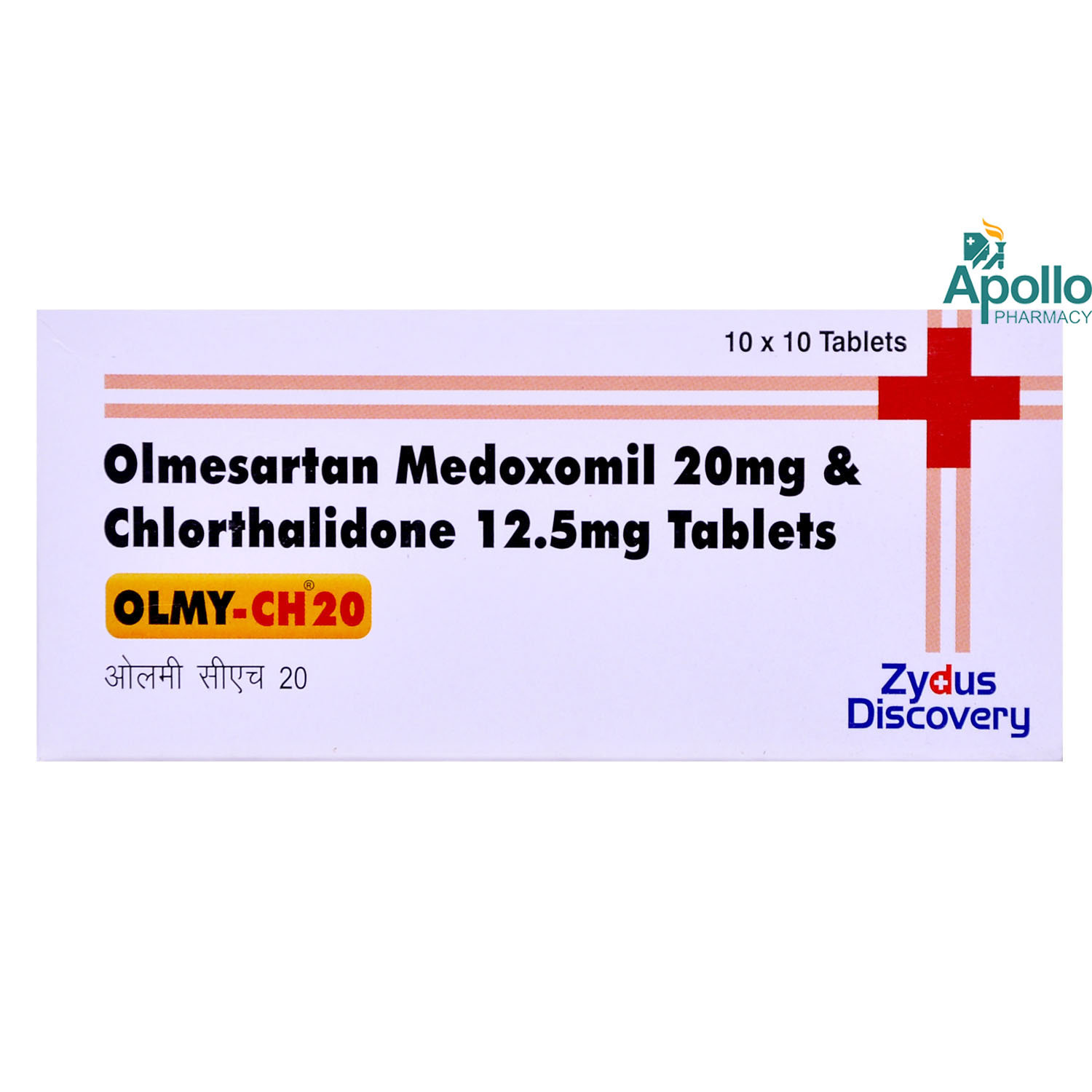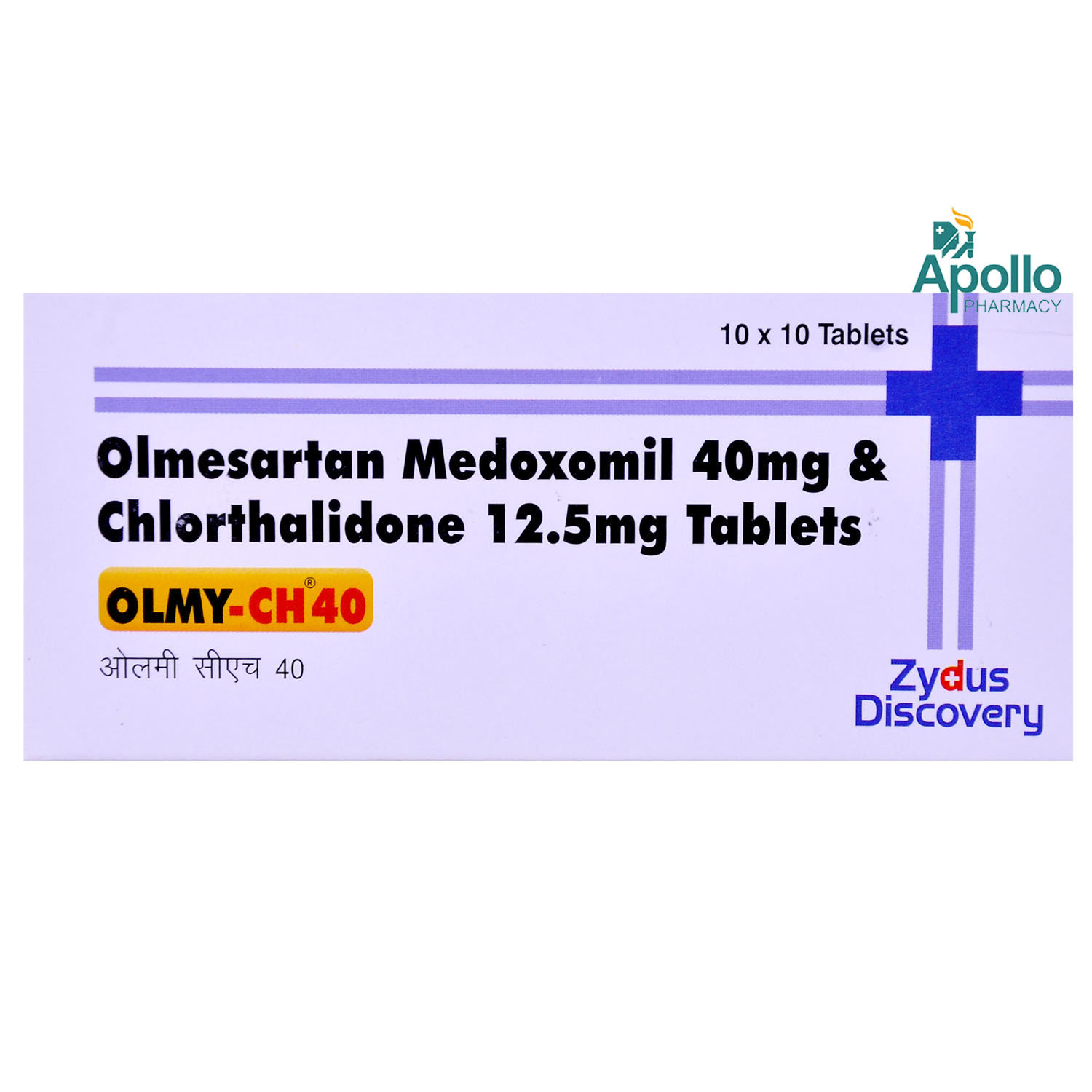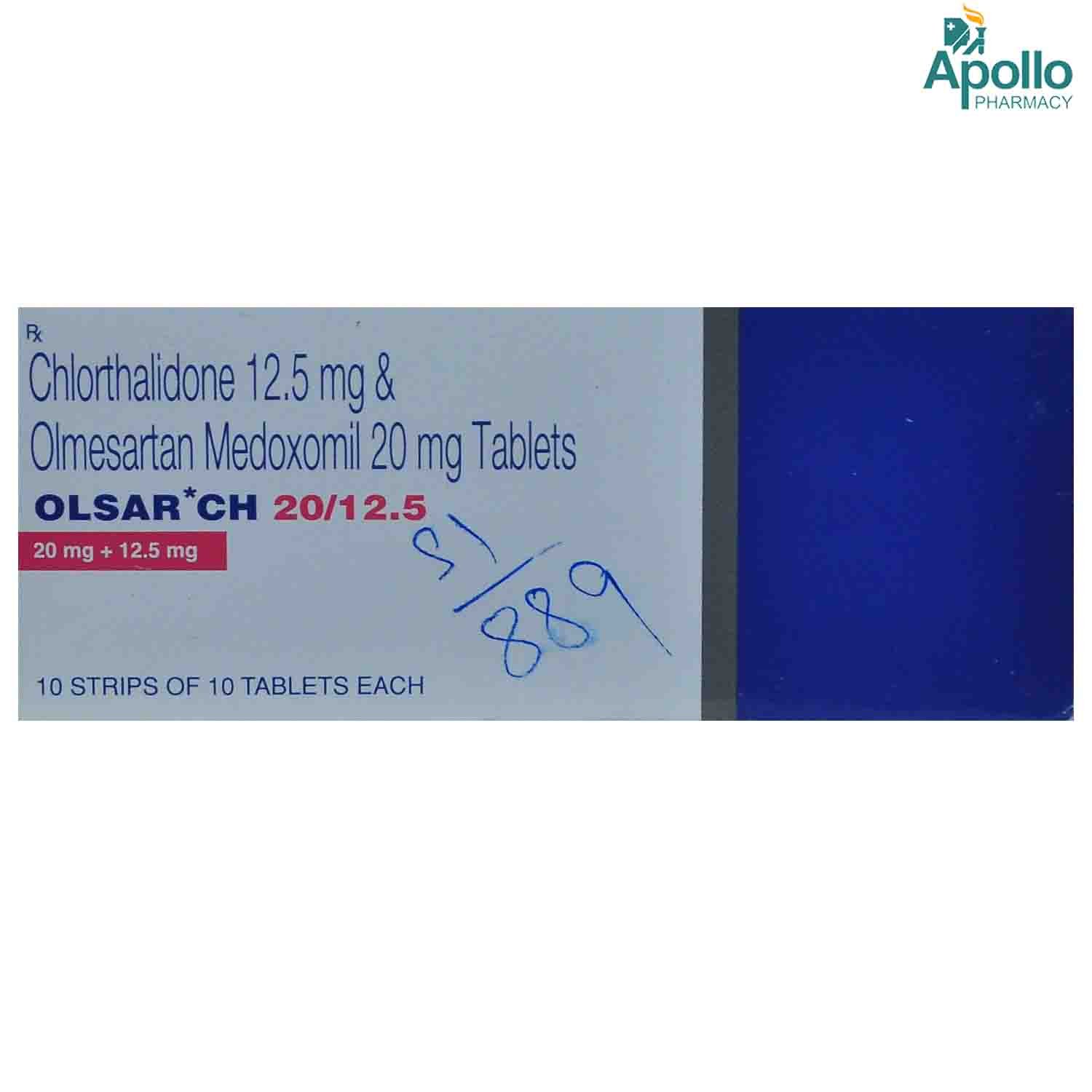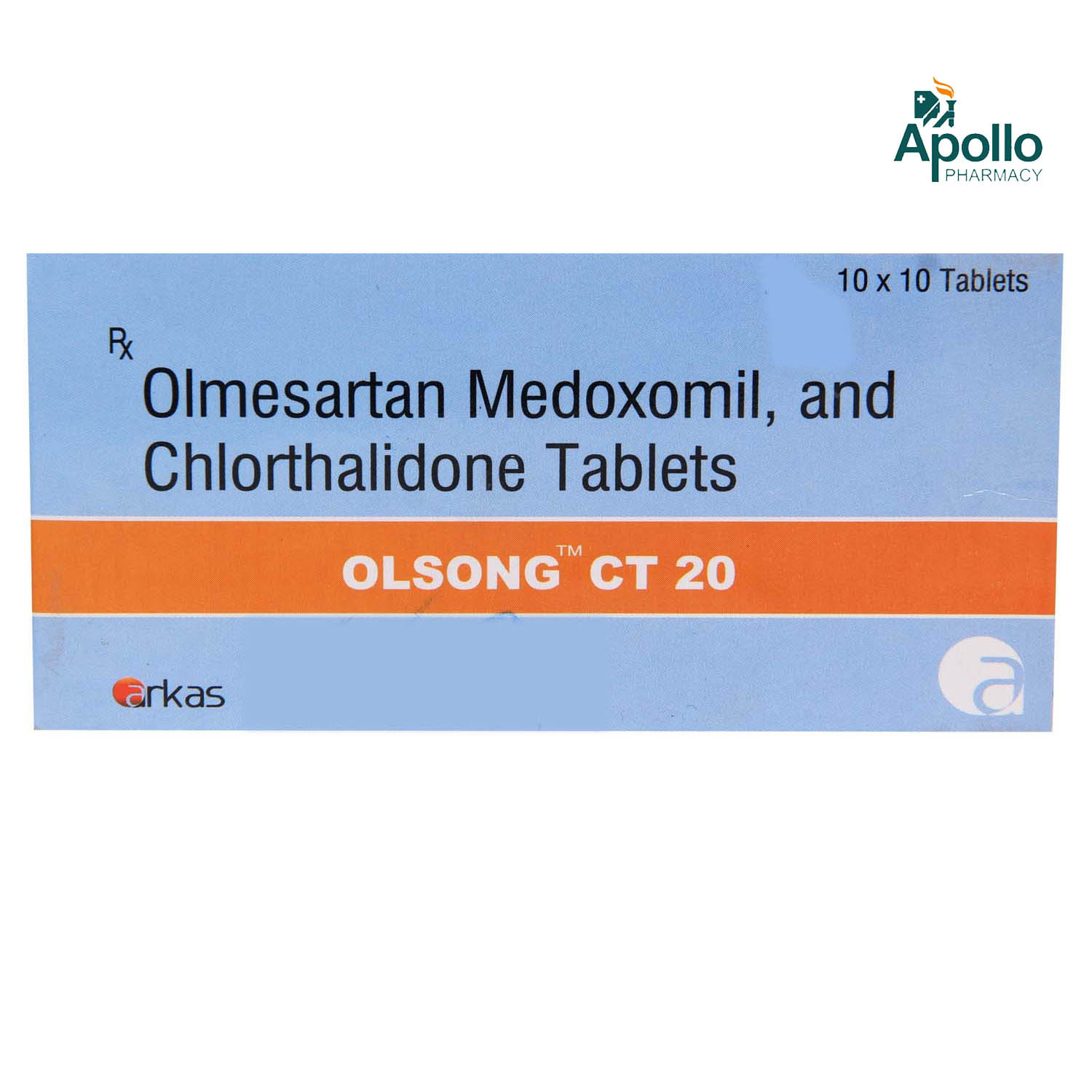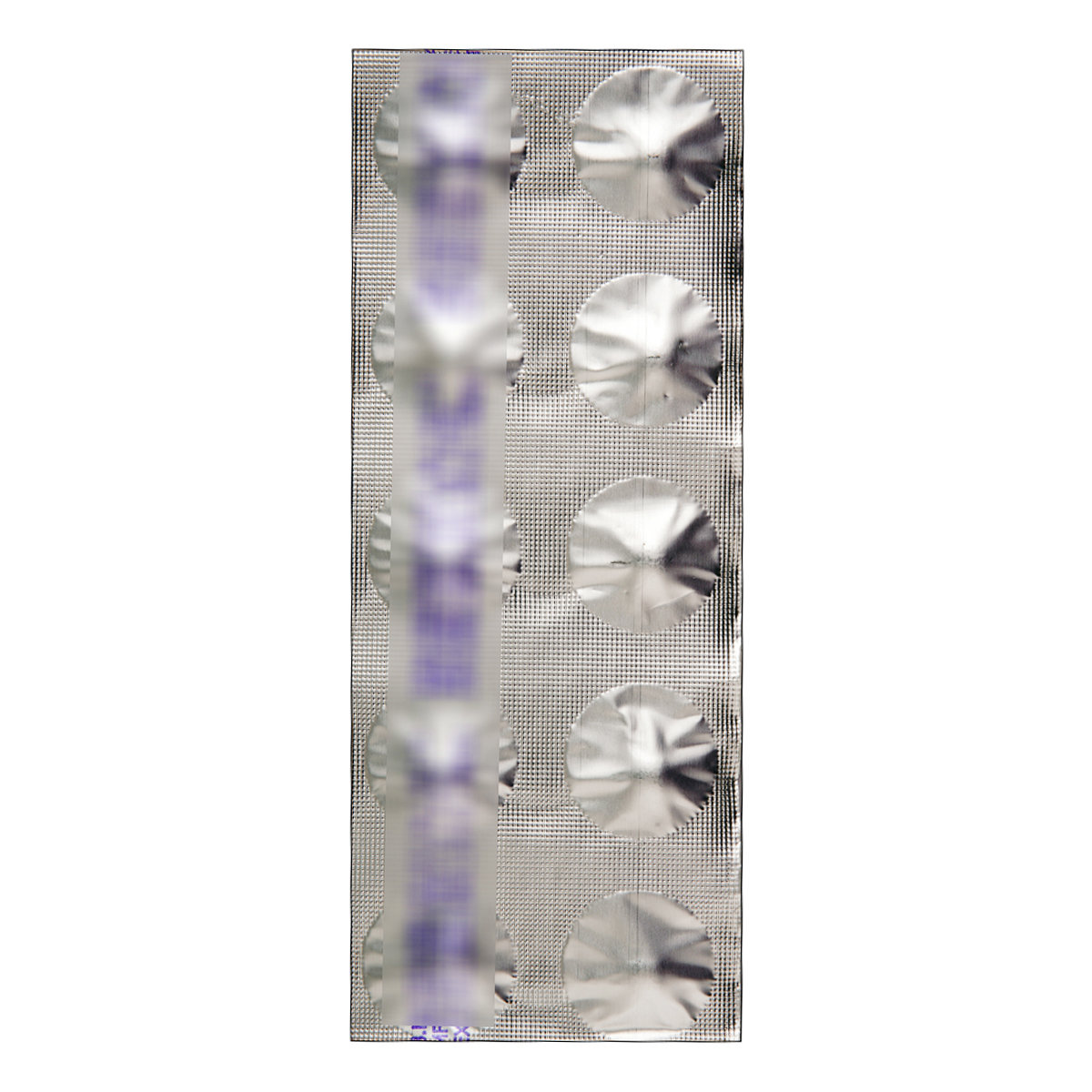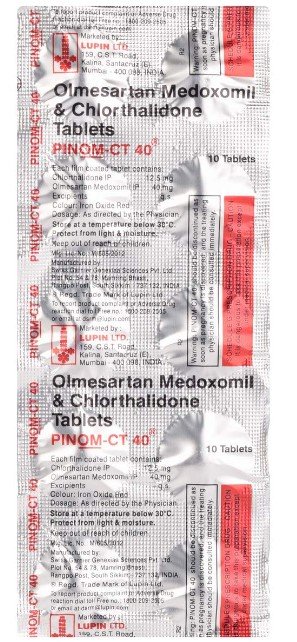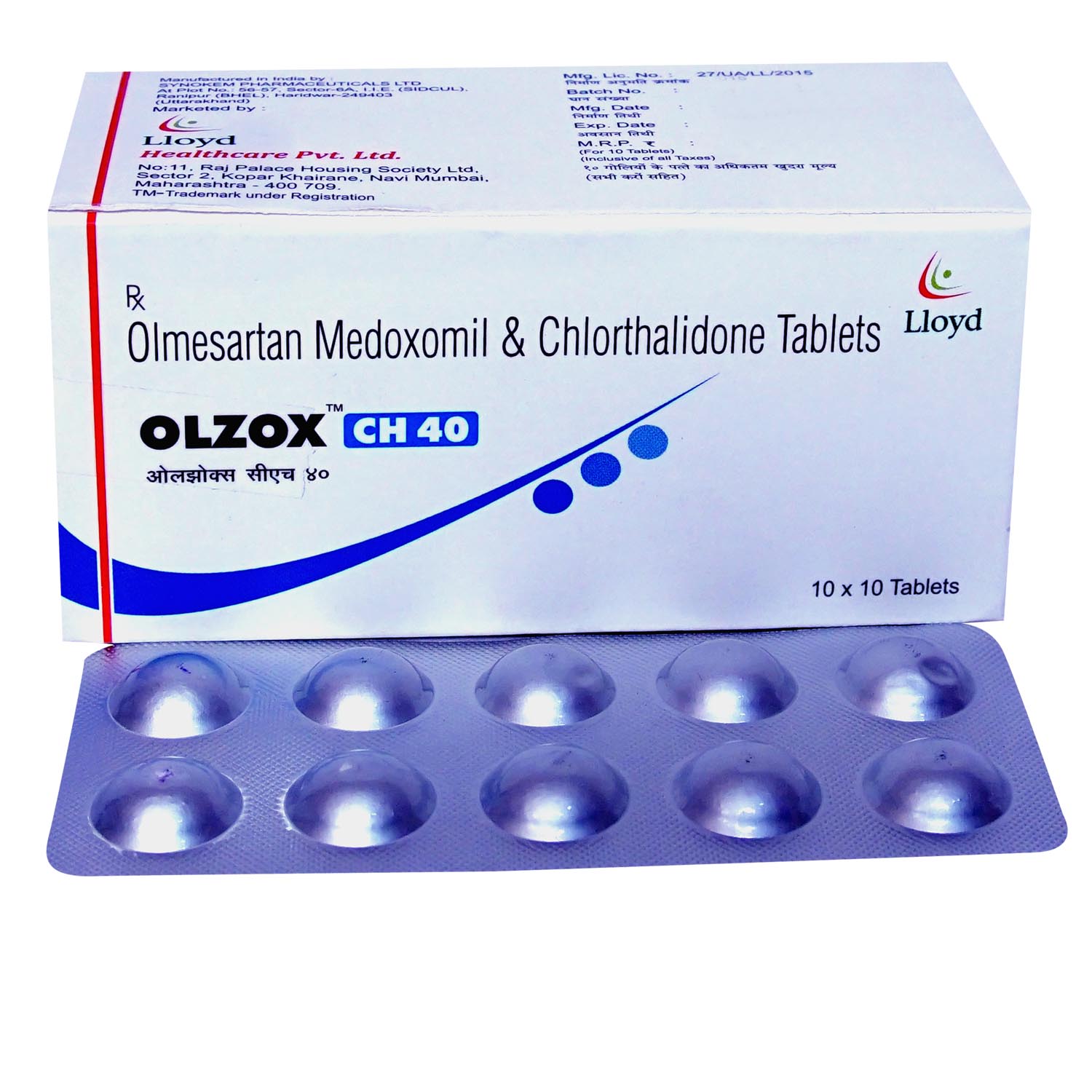Olmesartan+chlorthalidone
About Olmesartan+chlorthalidone
Olmesartan+chlorthalidone belongs to the class of medicines called ‘Anti-hypertensive’, primarily used to treat hypertension (high blood pressure). Hypertension or high blood pressure is a chronic condition in which the force exerted by the blood against the artery wall is high. As a result, it leads to heart disease, irregular heartbeat, and other complications.
Olmesartan+chlorthalidone is a combination of two medicines: Olmesartan and Chlorthalidone. Olmesartan is an angiotensin receptor blocker (ARB) that works by blocking the hormone angiotensin, thereby relaxing blood vessels. This allows the blood to flow more smoothly and the heart to pump more efficiently. On the other hand, Chlorthalidone is a diuretic or water pill that removes extra water and certain electrolytes from the body. Together it lowers fluid overload and blood pressure and improves blood flow.
Take Olmesartan+chlorthalidone as prescribed by your doctor. Your doctor will advise you on how often you take your tablets based on your medical condition. Sometimes, you may experience headaches, nausea, dizziness, and cold extremes. Most of these side effects of Olmesartan+chlorthalidone do not require medical attention and gradually resolve over time. However, if the side effects are persistent, reach out to your doctor.
Try not to stop taking this medicine of your own. Stopping Olmesartan+chlorthalidone abruptly may cause changes in your blood pressure and heart rhythm, cause chest pain, or a heart attack. Your doctor will gradually lower your dose over time to help prevent these symptoms. If you are pregnant or breastfeeding, it is advised to inform your doctor before using Olmesartan+chlorthalidone. If you are suffering from kidney, liver, or heart disease or are diabetic, please inform your doctor before taking Olmesartan+chlorthalidone. Do not use the Olmesartan+chlorthalidone if you cannot urinate, are dehydrated, have low blood pressure (hypotension), or have a cardiogenic shock (sudden stopping of blood flow to the heart). Reducing the amount of table salt (sodium chloride) in your food often relieves the swelling of the body. Please inform your doctor if you are using any prescription and non-prescription medications you are taking, including vitamins and herbal supplements.
Uses of Olmesartan+chlorthalidone
Medicinal Benefits
Olmesartan+chlorthalidone is a combination of two drugs, namely, Olmesartan (blood pressure-lowering agent) and Chlorthalidone (diuretic), primarily used to treat hypertension (high blood pressure). Olmesartan is an angiotensin receptor blocker (ARB) that lower increased blood pressure by blocking a naturally occurring substance known as angiotensin II (that tightens your blood vessels). It allows these constricted blood vessels to relax and therefore helps lower high blood pressure. This allows the blood to flow more smoothly and the heart to pump more efficiently. On the other hand, Chlorthalidone, a diuretic, works by increasing the amount of urine passed out from the kidneys and lowering blood pressure. Together it lowers the overall raised blood pressure and reduces the risk of having a heart attack, stroke, or kidney problems. Olmesartan+chlorthalidone is generally used when a single medicine is ineffective in controlling blood pressure.
Directions for Use
Storage
Side Effects of Olmesartan+chlorthalidone
- Dizziness
- Nausea
- Bradycardia (slow heart rate)
- Cold extremes
- Headache
- Hypotension (low blood pressure)
Drug Warnings
Olmesartan+chlorthalidone should not be given to people allergic to Olmesartan+chlorthalidone or any of its ingredients. Let your doctor know if you have low blood pressure (less than 90 mm of Hg) or have had a heart attack, kidney disease, or liver disease. Olmesartan+chlorthalidone is contraindicated in people with low blood pressure (hypotension), cardiogenic shock (sudden stopping of blood flow to the heart), and aortic stenosis (heart valve problem). Please inform your doctor before surgery if you are taking Olmesartan+chlorthalidone as it needs to be stopped because it might lower the blood pressure further if taken along with local anaesthesia. Pregnant women should discontinue Olmesartan+chlorthalidone because it can cause injury and death to the developing fetus. Tell your doctor if you are on low sodium (table salt) diet. Cases of electrolyte imbalance have been observed (like low levels of sodium, potassium, or magnesium in your blood). So your doctor might advise monitoring blood pressure, kidney function test, and electrolytes. Please do not stop taking Olmesartan+chlorthalidone on your own, as it may lead to the recurrence of symptoms or worsen the condition.
Drug Interactions
Drug-Drug Interactions: Olmesartan+chlorthalidone may interact with other high blood pressure-lowering pills (enalapril, captopril, lisinopril, ramipril, benazepril, diltiazem, verapamil, amiloride, metoprolol, hydrochlorothiazide, simvastatin, atorvastatin, azilsartan), medicine to treat erectile dysfunction (sildenafil), antibiotics (clarithromycin, erythromycin, rifampicin), antifungal (itraconazole, ketoconazole), anti-epilepsy medications (carbamazepine, phenytoin, phenobarbital, primidone), medicines used to treat asthma (salbutamol, formoterol), anti-HIV drugs (ritonavir), immune-suppressing drugs (cyclosporine, tacrolimus), and pain killers (ibuprofen, naproxen, diclofenac, aspirin).
Drug-Food Interactions: Olmesartan+chlorthalidone severely interacts with grapefruit, grapefruit juices, and St. John’s wort (a plant used to treat depression). Hence it should not be taken with Olmesartan+chlorthalidone.
Drug-Disease Interactions: Olmesartan+chlorthalidone may interact with disease conditions including low blood pressure (hypotension), heart valve problem (stenosis), cardiogenic shock (when the heart fails to pump required blood to the body), coronary heart disease, liver disease, renal impairment, or heart failure.
Drug-Drug Interactions Checker List:
Safety Advice

Alcohol
cautionIt is unsafe to consume alcohol, since alcohol consumption with Olmesartan+chlorthalidone may increase the risk of low blood pressure and cause adverse effects such as dizziness, fainting, light-headedness, or headache.

Pregnancy
cautionOlmesartan+chlorthalidone must not be used when pregnancy unless clearly necessary. So, inform your doctor if you are pregnant or suspect pregnancy. Your doctor will weigh the benefits and potential risks before prescribing Olmesartan+chlorthalidone.

Breast Feeding
cautionLet your doctor know if you are a nursing mother before taking Olmesartan+chlorthalidone; your doctor will decide whether Olmesartan+chlorthalidone can be taken by breastfeeding mothers or not.

Driving
unsafeOlmesartan+chlorthalidone may cause side effects like dizziness, headaches, nausea or tiredness, which can affect your ability to concentrate and drive. Hence, it is recommended not to drive or operate machinery until you are mentally alert.

Liver
cautionOlmesartan+chlorthalidone to be taken with caution, especially if you have had a history of liver disease. Your doctor will have to change the dosage depending on your medical condition and your reaction to treatment.

Kidney
cautionOlmesartan+chlorthalidone to be taken with caution, especially if you have a history of kidney diseases/conditions. The dose may have to be adjusted by your doctor.

Children
cautionOlmesartan+chlorthalidone to be taken with caution, especially if you are children below the age of 12. Your doctor may adjust your dose depending upon your age.
Habit Forming
Diet & Lifestyle Advise
- Create a well-balanced and healthy diet that includes vegetables, fruits, whole grains, legumes, omega-3-rich foods, and lean protein sources.
- Keep your weight under control with a BMI of 19.5-24.9.
- Avoid chronic stress, as it can raise your blood pressure.
- Spend time with your loved ones to cope with stress and practice mindfulness techniques.
- Be mindful of salt; consume no more than 2,300 mg each day.
- Limit or avoid alcohol consumption.
- Quitting smoking is the best strategy to lower the risk of heart disease.
Special Advise
- If you have diabetes and taking Olmesartan+chlorthalidone with other blood pressure-lowering pills like 'aliskiren,' immediately stop taking both together and consult a doctor, as it may cause serious complications.
- Do not use the Olmesartan+chlorthalidone if you are unable to urinate.
Patients Concern
Disease/Condition Glossary
Hypertension: The blood exerts increased pressure on the walls of blood vessels leading to hypertension. High blood pressure is expressed as systolic/diastolic pressure. Systolic pressure is the pressure in the arteries when the heart beats or pumps out blood. Diastolic pressure is the pressure in the arteries between the heartbeats. Blood pressure is measured in millimetres of mercury (mmHg) by a blood pressure monitor called a sphygmomanometer. Some of the symptoms are headache, dizziness, nosebleeds, altered vision, chest pain, weakness, and shortness of breath. However, most of the time, the signs and symptoms of hypertension are none.
FAQs
Olmesartan+chlorthalidone is a combination of two drugs: Olmesartan and Chlorthalidone. Olmesartan belongs to a class of angiotensin receptor blockers that works by relaxing and widening your blood vessels so your blood can flow more easily. This will lower your blood pressure. Chlorthalidone belongs to the class of diuretics that works by increasing urine output, thereby reducing blood pressure.
Olmesartan+chlorthalidone is not recommended in pregnancy. It can affect and harm the baby. Consult your doctor before taking Olmesartan+chlorthalidone if you plan to become pregnant or are already pregnant. Your doctor will weigh the potential risks and benefits before prescribing Olmesartan+chlorthalidone.
High blood pressure is called 'Pregnancy-induced hypertension (PIH). It is harmful to both the baby and the mother. In the mother, very high blood pressure can cause seizures (fits), headache, swelling of feet, kidney damage, and a higher risk of bleeding during pregnancy and delivery. This can also affect the baby by causing abnormal fetal heart rate, risk of stillbirth, and a small baby. So, during pregnancy, you should have regular blood pressure monitoring. Visit your Obstetrician if you have any concerns about blood pressure during pregnancy.
Taking Olmesartan+chlorthalidone may cause dehydration. So, to avoid dehydration, drink plenty of fluids, and inform your doctor if you feel extremely thirsty.
No, you are advised to inform your doctor and monitor your blood pressure for at least two weeks before stopping the medicine. Depending upon your current blood pressure readings, there is a possibility your doctor may lower your medicine dosage and not recommend discontinuing it.
Olmesartan+chlorthalidone can be safely taken as long as your doctor prescribes it. Chronic disease conditions like high blood pressure are life-long conditions, and one should not abruptly discontinue it without discussing it with a doctor.

